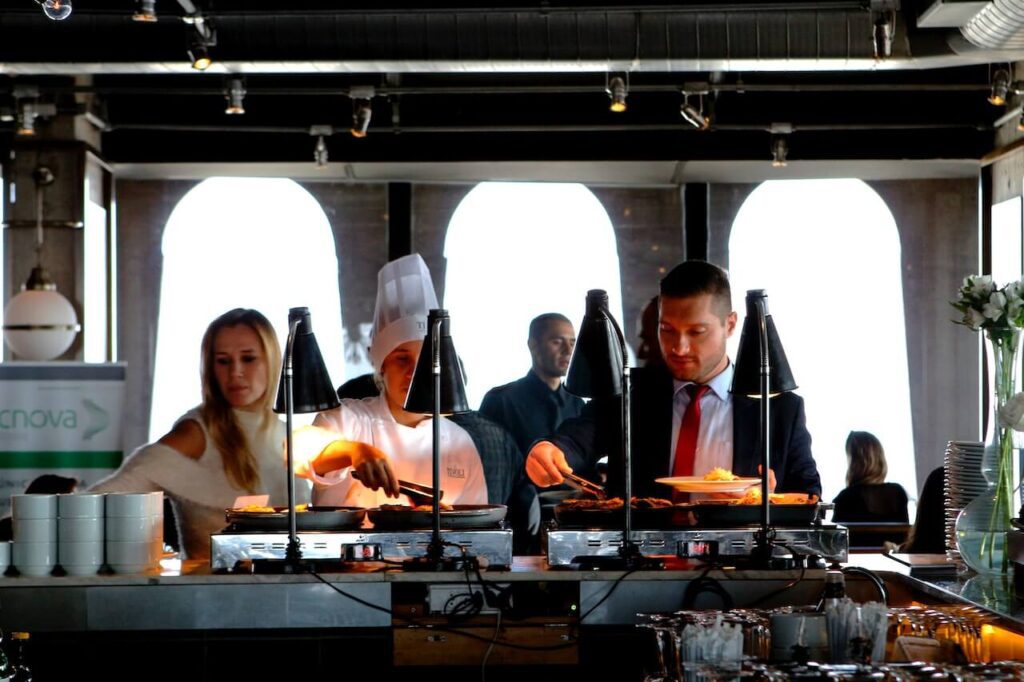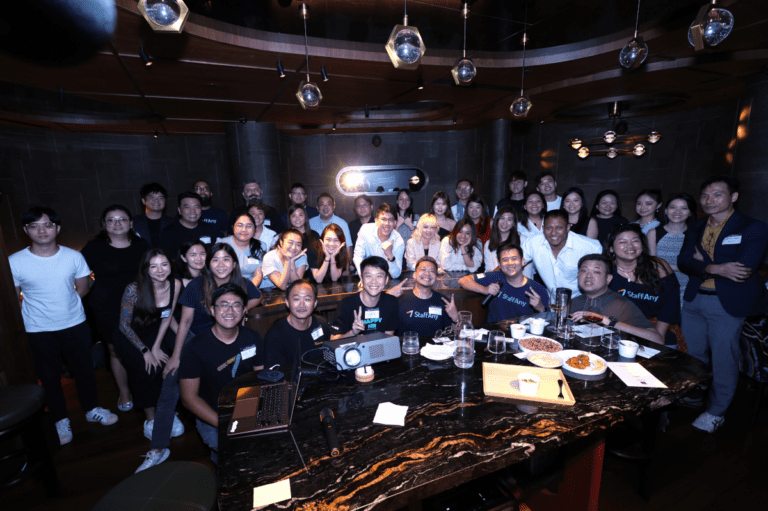Are you looking for how to manage a restaurant effectively and tackle any problems? Running a restaurant business is indeed a challenging but rewarding business. Whether you are a seasoned restaurant owner or just starting out, managing a restaurant effectively can make all the difference.
In this article, we will explore some essential things to consider when running a restaurant business, as well as a couple of restaurant management tips you can implement as a restaurant manager. We will also discuss five common problems in restaurants and their solutions. Let’s find out below!
Things to Consider When Managing a Restaurant

Effective restaurant management requires attention to many different areas. From staffing and inventory management to customer service and menu planning, there are many things to consider when running a restaurant. Thus, to all restaurant managers, here are several essential things to consider when managing a restaurant:
1. Staffing
Staffing is a critical component of the restaurant management. Your staff is the backbone of your day to day operations, and having the right team in place is essential for success restaurant business management.
Ensure your staff is well-trained, motivated, and capable of handling their responsibilities. Encourage open communication, offer opportunities for growth and development, and provide incentives to keep your staff motivated.
Read More: 7 Great Employee Retention Strategies
2. Inventory Management
Efficient inventory management is vital to the success of any restaurant industry. As a restaurant manager, you need to know what ingredients you need, when, and how much to order. Implement a system that tracks your inventory, sets par levels, and automates reordering to avoid running out of stock. Keep an eye on your inventory costs and optimise your inventory levels to reduce waste and minimise costs.
3. Customer Service
Providing excellent customer service is critical to attracting and retaining customers. Train your staff to be friendly, attentive, and responsive to customer complaints. Respond to positive and negative feedback and make necessary changes to improve customer satisfaction. Personalise the customer experience by getting to know your regulars and addressing them by name.
4. Menu Planning
Your menu is the face of your food service industry, and planning it effectively can make all the difference. Consider your target audience, seasonal ingredients, and your competitors’ offerings while creating your menu.
Keep your menu updated with new dishes, specials, and seasonal items to keep your customers engaged. Offer a range of options, including vegetarian, vegan, and gluten-free dishes, to cater to all dietary needs.
5. Marketing and Promotion
Marketing and promotion are essential restaurant management to attracting new customers and keeping your restaurant top of mind for existing ones. Develop a marketing plan that includes both traditional and digital channels, such as social media, email marketing, and local advertising.
Not only that, you should offer promotions, discounts, and loyalty programs to encourage repeat business and word-of-mouth referrals. Attend community events, sponsor local sports teams, and get involved in the local community to build brand awareness and loyalty.
6. Quality Control
Maintain consistency in food preparation, taste, and presentation. Implement quality control measures to ensure that each dish meets the established standards. Regularly assess customer feedback and conduct internal evaluations to identify areas for improvement.
7. Regulatory Compliance
An effective restaurant manager also knows in updating with local health and safety regulations, permits, and licensing requirements. Ensure compliance with food handling, sanitation, and fire safety standards. Stay updated on changes in regulations and make necessary adjustments to maintain legal compliance.
Read More: 5 Ways to Build a Positive Company Culture
Essential Tips to Manage a Restaurant Effectively

Now that we’ve covered some essential considerations when managing a restaurant, let’s look at some tips to manage it effectively.
1. Hire and Train the Right Staff
As mentioned before, your restaurant workers is your restaurant’s backbone, and hiring and training the right people is essential approach of restaurant management. Look for individuals with experience in the industry, positive attitudes, and excellent customer service skills. Provide thorough training to ensure that your staff can handle all aspects of your restaurant’s operations, from food preparation to customer service.
2. Implement Effective Inventory Management
Effective inventory management is crucial for managing a restaurant effectively. Keep a detailed inventory of all food and supplies, as well as regularly update it to ensure that you have enough stock to meet customer demand. Set up systems for tracking inventory, such as automated ordering systems, to help reduce waste and control costs.
3. Use Technology to Streamline Operations
Technology can be a powerful tool for managing a restaurant effectively. Invest in a restaurant management system that can streamline your operations, such as human resource management software like StaffAny. This software can help reduce errors, improve efficiency, and provide better customer expectations.
4. Prioritise Food Safety and Sanitation
Food safety and sanitation are critical for the success of any restaurant. Develop and implement strict protocols for food handling, storage, and preparation to ensure your food is safe and contamination-free. Train your staff in food safety and sanitation practices, and regularly inspect your kitchen and dining areas to maintain a clean and safe environment.
5. Monitor Your Financials
Keeping a close eye on your finances for example labor costs or operating costs is crucial for managing a restaurant effectively. Monitor your expenses and revenue regularly, and adjust your pricing and menu offerings as needed to maintain profitability.
In addition, All restaurant managers should ensure you have a good understanding of your restaurant’s cash flow. Keep detailed records of all financial transactions, and work with an accountant or bookkeeper to ensure that your finances is in order.
6. Effective Communication
As a restaurant manager, you should foster open and effective communication with your team. Encourage feedback, suggestions, and ideas from staff members. Conduct regular team meetings and provide clear instructions to ensure everyone is on the same page. Be approachable and available to address concerns or issues promptly.
7. Stay on Top of Industry Trends
Continuously monitor industry trends, customer preferences, and competitors. Stay informed about new culinary concepts, technology advancements, and market demands. Embrace innovation and adapt your offerings and operations accordingly to stay ahead of the competition.
8. Build Relationships
Cultivate strong relationships with suppliers, vendors, and local community stakeholders. Maintain clear communication channels and negotiate favorable terms. Participate in community events and collaborate with other businesses to create mutually beneficial partnerships.
9. Embrace Feedback and Continuous Improvement
Regularly seek feedback from customers and employees to identify areas for improvement. Conduct performance evaluations and provide constructive feedback to help your team grow. Continuously innovate and adapt your menu, services, and operations to meet changing customer needs and stay relevant.
Remember, to be a great restaurant manager requires a combination of leadership skills, attention to detail, and a passion for excellence. By implementing these tips, you can create a positive and successful environment that delights customers, empowers your restaurant staff, and drives business growth.
Common Problems in Restaurants and Their Solutions

Despite your best efforts, problems are bound to arise in any restaurant. Here are some common problems that usually occur in restaurants and their solutions:
1. High Employee Turnover
Employee turnover can be a significant challenge in the restaurant industry, leading to increased costs and reduced productivity. To address this problem, you can try to:
Focus on creating a positive work environment and offering competitive compensation and benefits.
Provide opportunities for professional development and growth, and establish clear policies and procedures for staff.
Consistently recognize and reward outstanding performance for encouraging employee retention.
2. Inconsistent Food Quality
Inconsistent food quality can be a major source of frustration for customers and harm your restaurant’s reputation. To maintain consistent food quality, you can try to:
Establish standard operating procedures for food preparation and presentation.
Train your staff on these procedures and conduct regular quality control checks to ensure that your food meets your standards.
Use fresh, high-quality ingredients and maintain strict food safety and sanitation protocols.
3. Poor Customer Service
Poor customer service can lead to negative reviews, reduced revenue, and decreased customer loyalty. To address this problem, you can try to:
Provide comprehensive training for your staff on effective customer service techniques, including listening actively, responding promptly, and resolving complaints.
Encourage your staff to be friendly and engaging with customers, and offer incentives for outstanding customer service.
4. Inventory Management Issues
Poor inventory management can lead to food waste, lost revenue, and increased costs. To address this problem, you can try to:
Establish clear inventory management procedures and regularly track your inventory levels.
Use software and other tools to help you manage your inventory effectively, and establish protocols for ordering, receiving, and storing food and supplies.
5. Slow Service
Slow service can be a major source of bad reviews from customers and harm your restaurant’s reputation. To address this problem, you can try to:
Optimise your operations for efficiency and speed.
Use technology, such as mobile ordering and payment systems, to streamline the ordering and payment processes.
Train your staff on effective time management and workflow techniques, and establish clear procedures for handling busy periods.
6. High Operating Costs
Operating a restaurant can be costly, considering all the food and beverage costs like food, rent, paying employees, and other bills. To make things more affordable, restaurant owners should regularly look at their spending and find places where they can spend less money.
Talking to the people who sell them food and supplies can also be a way to spend less. Besides that, finding ways to create less waste and using equipment that doesn’t use too much energy can help save money in the long run.
7. Limited Menu Options
Having too few choices on the menu might disappoint customers who want more options. On the other hand, having too many items can cause problems with keeping track of what’s in stock and might make the food quality go down.
So, restaurant owners need to find a middle ground. They should offer a good variety to please customers but not so much that it becomes hard to manage.
To do this, they can regularly look at the menu and figure out what people like the most and remove things that aren’t as popular. This way, they can keep customers happy and avoid wasting food.
8. Online Reputation Management
Online reviews can have a big effect on how people see a restaurant, and bad reviews can make customers go somewhere else. To deal with this, restaurant owners should be quick and polite when they see a bad review.
They should try to fix the problem and make the customer happy. It’s also a good idea to ask happy customers to leave good reviews to balance out the bad ones.
Restaurant owners should also keep an eye on their online stuff, like their website, social media, and review sites, to make sure everything looks right and shows the restaurant in a good way.
9. Lack of Communication
Good communication is like the glue that holds a team together, and it’s super important in the restaurant business. When people don’t talk enough, it can cause mix-ups, errors, and fights. To prevent this, restaurant owners should make sure their team gets together for meetings often.
They should also tell their staff to be open and truthful when they talk to each other. Using tools like Slack can also make talking and working together easier.
10. Food Safety and Hygiene
Making sure the food is safe to eat and keeping everything clean is super important in the restaurant business. If things go wrong, people can get sick, and there might be legal trouble. So, restaurant owners need to set up strict rules about how to handle food safely and keep things clean.
This means they have to clean and sanitize everything regularly, store food correctly, and follow the right steps when they’re working with food. They also need to teach their staff how to do all of this and make sure everyone follows the rules. If someone doesn’t, they need to deal with it right away to keep customers and staff safe.
If you want to implement effective employee management strategies and streamline your restaurant operations, consider using StaffAny’s smart timesheets. With StaffAny, you can automate your scheduling, time tracking, and payroll processes, saving time and reducing errors.
Try StaffAny’s smart timesheets and our other features today to optimise your staff management and improve your restaurant’s performance! Contact us now to learn more and say goodbye to manual timesheet consolidation!












